Hexagramme 52 du Yi Jing - Trait 1
L'hexagramme : 52
Un hexagramme est une combinaison de six traits yin et yang.

52.1 (52 > 22) - THE KĂN HEXAGRAM.
The first line, divided, shows its subject keep- ing his toes at rest. There will be no error; but it will be advantageous for him to be persistently firm and correct.
Bing DeepL Google Yandex52.1 (52 > 22) - Dropping one's probe
One is not going to see what others are doing, to avoid trouble.
Bing DeepL Google Yandex52.1 (52 > 22) - Dropping one's probe
One is not going to see what others are doing, to avoid trouble.
Bing DeepL Google Yandex52.1 (52 > 22) - Kán, l’arrêt
Kán : ferme, tenir droit, bien réglé, arrêter, reposer
(On doit) tenir fermes ses pieds ; i. e. être toujours d’une ferme droiture.
Ne jamais perdre sa droiture.
52.1 (52 > 22) - Renoncer à son enquête
On ne va pas voir ce que font les autres, pour éviter les ennuis.
Bing DeepL Google Yandex52.1 (52 > 22) - Megállás
Nem megy megnézni mit tesznek a többiek hogy kerülje a bajokat.
Bing DeepL Google YandexLes trigrammes
Les trigrammes sont des combinaisons de trois traits yin et yang. Dans l'hexagramme, les trois traits du dessous constituent le trigramme inférieur et représentent la situation intérieure. Les trois lignes du haut constituent le trigramme supérieur et représentent la situation extérieure.
trigSup

Trigramme inférieur : La montagne Le feu


L'hexagramme nucléaire : 40
L'hexagramme nucléaire est l'association des deux trigrammes intérieurs (traits 2,3,4 et 3,4,5). Il représente la racine, ou l'origine de la situation.

40 - THE KIEH HEXAGRAM.
In (the state indicated by) Kieh advantage will be found in the south-west. If no (further) operations be called for, there will be good fortune in coming back(to the old conditions). If some operations be called for, there will be good fortune in the early conducting of them.
Bing DeepL Google Yandex40 - Kieh, la libération
Kieh : 1. Délivrer, faire échapper, échapper au danger ; 2. Disperser ; 3. Ouvrir, séparer, s’ouvrir. Se dit du mouvement de la germination. 4. Résoudre une difficulté, une complication.
Texte et commentaire
Si l’on réussit à faire échapper aux dangers, on gagnera les gens à soi et l’on aura des relations heureuses ; on gardera le milieu. En tout ce que l’on fait, l’activité est chose utile et fait acquérir des mérites. Kieh est : se trouvant en danger, savoir agir et échapper. Quand le ciel et la terre ouvrent les pores (3e sens) des êtres, le tonnerre et la pluie se produisent. Alors les plantes et les arbres à fruit bourgeonnent. Bien important est le temps où tout s’ouvre.
Symbolisme
Le tonnerre et la pluie forment le Koua Kieh. Le sage est indulgent pour l’erreur et traite les coupables avec douceur.
Le dérivé (Fan Yao) : 22.1
Le même trait sur l'hexagramme après la mutation. Il représente ce qui peut être fait APRÈS pour corriger la situation décrite par ce trait, un peu comme un remède ou une solution.

22.1 (22 > 52) - THE PÎ HEXAGRAM.
The first line, undivided, shows one adorning (the way of) his feet. He can discard a carriage and walk on foot.
Bing DeepL Google Yandex22.1 (22 > 52) - Pî, la grâce
Pi : 1. Éclat, rayon, orner ; 2. Exercer, rendre fort.
On fortifie ses pieds, on les orne en quittant son char et allant à pied (par vertu). Com. Kang teh.
Bing DeepL Google Yandex22.1 (22 > 52) - Se faire lâcher
On nous fait confiance pour réussir sans aide.
Bing DeepL Google YandexLa jointure: 21.6
Le dérivé du réciproque. Il représente ce qui aurait pu être fait AVANT pour prévenir la situation décrite par ce trait, un peu comme un remède ou une solution.

21.6 (21 > 51) - THE SHIH HO HEXAGRAM.
The sixth line, undivided, shows one wearing the cangue, and deprived of his ears. There will be evil.
Bing DeepL Google Yandex21.6 (21 > 51) - Condemning the lack of care
One has stopped being unstable but others are waiting for answers before one can rest.
Bing DeepL Google Yandex21.6 (21 > 51) - Condemning the lack of care
One has stopped being unstable but others are waiting for answers before one can rest.
Bing DeepL Google Yandex21.6 (21 > 51) - Shih hok, mordre au travers
Shih hok : 1. Bavardage mordant, méchant ; 2. Hok : mordre, mâcher.
Les pieds aux fers et les oreilles coupées, châtiment terrible n’est-ce pas ? Mais (le méchant calomniateur) entend (ces menaces) et ne comprend pas.
Bing DeepL Google Yandex21.6 (21 > 51) - Condamner le manque d'attention
On a cessé d'être instable mais les autres attendent des réponses avant que l'on puisse se reposer.
Bing DeepL Google Yandex21.6 (21 > 51) - Döntés
Már nem bizonytalankodik de a többiek még válaszokat várnak mielőtt pihenhetne.
Bing DeepL Google YandexLe réciproque : 51.6
L'hexagramme renversé. Il représente la situation opposée, et en tant que tel est essentiel pour la validation des commentaires.

51.6 (51 > 21) - THE KĂN HEXAGRAM.
The topmost line, divided, shows its subject, amidst the startling movements (of the time), in breathless dismay and looking round him with trembling apprehension. If he take action, there will be evil. If, while the startling movements have not reached his own person and his neighbourhood, (he were to take precautions), there would be no error, though his relatives might (still) speak against him.
Bing DeepL Google Yandex51.6 (51 > 21) - Taking refuge in the heights
One has lost the weakest, so one keeps a low profile until they change.
Bing DeepL Google Yandex51.6 (51 > 21) - Taking refuge in the heights
One has lost the weakest, so one keeps a low profile until they change.
Bing DeepL Google Yandex51.6 (51 > 21) - Kán, l’ébranlement
Kán : tonnerre, effroi répandu, crainte.
Le tonnerre répand l’effroi et fait partout regarder avec trouble et crainte. S’il atteint et frappe, il causera un grand mal. (Ou : il corrige le mal.) Mais s’il ne frappe ni tel personnage, ni ses voisins, ce ne sera point un mal et fera seulement jaser les habitants d’une même maison.
Quand le tonnerre gronde, que l’orage éclate, le sage recherche la cause de ce fait (et tâche de profiter de l’avertissement céleste).
51.6 (51 > 21) - Se réfugier dans les hauteurs
On a perdu les plus faibles alors on reste discret jusqu'à ce qu'ils changent.
Bing DeepL Google Yandex51.6 (51 > 21) - Megrázkódtatás
Elvesztette a leggyengébbet, visszafogottnak kell maradnia míg nem változnak.
Bing DeepL Google YandexMutations

52.1 (52 > 22) - THE KĂN HEXAGRAM.
The first line, divided, shows its subject keep- ing his toes at rest. There will be no error; but it will be advantageous for him to be persistently firm and correct.
Bing DeepL Google Yandex52.1 (52 > 22) - Dropping one's probe
One is not going to see what others are doing, to avoid trouble.
Bing DeepL Google Yandex52.1 (52 > 22) - Dropping one's probe
One is not going to see what others are doing, to avoid trouble.
Bing DeepL Google Yandex52.1 (52 > 22) - Kán, l’arrêt
Kán : ferme, tenir droit, bien réglé, arrêter, reposer
(On doit) tenir fermes ses pieds ; i. e. être toujours d’une ferme droiture.
Ne jamais perdre sa droiture.
52.1 (52 > 22) - Renoncer à son enquête
On ne va pas voir ce que font les autres, pour éviter les ennuis.
Bing DeepL Google Yandex52.1 (52 > 22) - Megállás
Nem megy megnézni mit tesznek a többiek hogy kerülje a bajokat.
Bing DeepL Google Yandex
52.1.2 (52 > 26) - THE KĂN HEXAGRAM.
- 1. The first line, divided, shows its subject keep- ing his toes at rest. There will be no error; but it will be advantageous for him to be persistently firm and correct.
- 2. The second line, divided, shows its subject keeping the calves of his legs at rest. He cannot help (the subject of the line above) whom he follows, and is dissatisfied in his mind.
52.1.2 (52 > 26) - Stop
One pins one's last hopes on a youth whom one has never stopped abusing.
Bing DeepL Google Yandex52.1.2 (52 > 26) - Stop
One pins one's last hopes on a youth whom one has never stopped abusing.
Bing DeepL Google Yandex52.1.2 (52 > 26) - Kán, l’arrêt
Kán : ferme, tenir droit, bien réglé, arrêter, reposer
-
1. (On doit) tenir fermes ses pieds ; i. e. être toujours d’une ferme droiture.
Ne jamais perdre sa droiture. -
2. « Arrêter le mouvement des jambes ». (Ou les tenir droites et bien posées.) Si, devant s’arrêter, on ne peut aider celui qui marche devant soi, on doit en avoir du déplaisir.
On doit aider et se rendre au cri d’appel.
52.1.2 (52 > 26) - Cesser
On place ses derniers espoirs dans une jeunesse que l'on n'a eu de cesse de maltraiter.
Bing DeepL Google Yandex52.1.2 (52 > 26) - Megállás
- 1. Nem megy megnézni mit tesznek a többiek hogy kerülje a bajokat.
- 2. Ha a másik többet akar, nem tarthatja vissza.

52.1.3 (52 > 27) - THE KĂN HEXAGRAM.
- 1. The first line, divided, shows its subject keep- ing his toes at rest. There will be no error; but it will be advantageous for him to be persistently firm and correct.
- 3. The third line, undivided, shows its subject keeping his loins at rest, and separating the ribs (from the body below). The situation is perilous, and the heart glows with suppressed excitement.
52.1.3 (52 > 27) - Stop
One has returned most of the items one borrowed, but some are missing.
Bing DeepL Google Yandex52.1.3 (52 > 27) - Stop
One has returned most of the items one borrowed, but some are missing.
Bing DeepL Google Yandex52.1.3 (52 > 27) - Kán, l’arrêt
Kán : ferme, tenir droit, bien réglé, arrêter, reposer
-
1. (On doit) tenir fermes ses pieds ; i. e. être toujours d’une ferme droiture.
Ne jamais perdre sa droiture. - 3. Se tenir ferme à sa place et le corps (litt. : les côtes) bien tenu, (c’est ainsi que l’on doit être).
52.1.3 (52 > 27) - Cesser
On a restitué la plupart des objets que l'on avait emprunté mais certains manquent à l'appel.
Bing DeepL Google Yandex52.1.3 (52 > 27) - Megállás
- 1. Nem megy megnézni mit tesznek a többiek hogy kerülje a bajokat.
- 3. A legalkalmasabbat kéri ha mások nem válaszolnak.

52.1.2.3 (52 > 41) - THE KĂN HEXAGRAM.
- 1. The first line, divided, shows its subject keep- ing his toes at rest. There will be no error; but it will be advantageous for him to be persistently firm and correct.
- 2. The second line, divided, shows its subject keeping the calves of his legs at rest. He cannot help (the subject of the line above) whom he follows, and is dissatisfied in his mind.
- 3. The third line, undivided, shows its subject keeping his loins at rest, and separating the ribs (from the body below). The situation is perilous, and the heart glows with suppressed excitement.
52.1.2.3 (52 > 41) - Stop
One is dropped by friends when one was going to do them good.
Bing DeepL Google Yandex52.1.2.3 (52 > 41) - Stop
One is dropped by friends when one was going to do them good.
Bing DeepL Google Yandex52.1.2.3 (52 > 41) - Kán, l’arrêt
Kán : ferme, tenir droit, bien réglé, arrêter, reposer
-
1. (On doit) tenir fermes ses pieds ; i. e. être toujours d’une ferme droiture.
Ne jamais perdre sa droiture. -
2. « Arrêter le mouvement des jambes ». (Ou les tenir droites et bien posées.) Si, devant s’arrêter, on ne peut aider celui qui marche devant soi, on doit en avoir du déplaisir.
On doit aider et se rendre au cri d’appel. - 3. Se tenir ferme à sa place et le corps (litt. : les côtes) bien tenu, (c’est ainsi que l’on doit être).
52.1.2.3 (52 > 41) - Cesser
On se fait lâcher par ses amis alors qu'on allait leur faire du bien.
Bing DeepL Google Yandex52.1.2.3 (52 > 41) - Megállás
- 1. Nem megy megnézni mit tesznek a többiek hogy kerülje a bajokat.
- 2. Ha a másik többet akar, nem tarthatja vissza.
- 3. A legalkalmasabbat kéri ha mások nem válaszolnak.

52.1.4 (52 > 30) - THE KĂN HEXAGRAM.
- 1. The first line, divided, shows its subject keep- ing his toes at rest. There will be no error; but it will be advantageous for him to be persistently firm and correct.
- 4. The fourth line, divided, shows its subject keeping his trunk at rest. There will be no error.
52.1.4 (52 > 30) - Stop
One returns to one's allies to ask them if they want to continue the fight.
Bing DeepL Google Yandex52.1.4 (52 > 30) - Stop
One returns to one's allies to ask them if they want to continue the fight.
Bing DeepL Google Yandex52.1.4 (52 > 30) - Kán, l’arrêt
Kán : ferme, tenir droit, bien réglé, arrêter, reposer
-
1. (On doit) tenir fermes ses pieds ; i. e. être toujours d’une ferme droiture.
Ne jamais perdre sa droiture. - 4. Tenir le corps droit et ferme, c’est une bonne manière. [On doit tenir le corps entier tout droit.] (Répétition du § 3 pour en avoir six. Tenir le corps droit est un principe essentiel des rites chinois.)
52.1.4 (52 > 30) - Cesser
On retourne vers ses alliés pour leur demander si ils veulent poursuivre la lutte.
Bing DeepL Google Yandex52.1.4 (52 > 30) - Megállás
- 1. Nem megy megnézni mit tesznek a többiek hogy kerülje a bajokat.
- 4. Megáll, de mások folytatják.

52.1.2.4 (52 > 14) - THE KĂN HEXAGRAM.
- 1. The first line, divided, shows its subject keep- ing his toes at rest. There will be no error; but it will be advantageous for him to be persistently firm and correct.
- 2. The second line, divided, shows its subject keeping the calves of his legs at rest. He cannot help (the subject of the line above) whom he follows, and is dissatisfied in his mind.
- 4. The fourth line, divided, shows its subject keeping his trunk at rest. There will be no error.
52.1.2.4 (52 > 14) - Stop
One slows down those who get involved too quickly.
Bing DeepL Google Yandex52.1.2.4 (52 > 14) - Stop
One slows down those who get involved too quickly.
Bing DeepL Google Yandex52.1.2.4 (52 > 14) - Kán, l’arrêt
Kán : ferme, tenir droit, bien réglé, arrêter, reposer
-
1. (On doit) tenir fermes ses pieds ; i. e. être toujours d’une ferme droiture.
Ne jamais perdre sa droiture. -
2. « Arrêter le mouvement des jambes ». (Ou les tenir droites et bien posées.) Si, devant s’arrêter, on ne peut aider celui qui marche devant soi, on doit en avoir du déplaisir.
On doit aider et se rendre au cri d’appel. - 4. Tenir le corps droit et ferme, c’est une bonne manière. [On doit tenir le corps entier tout droit.] (Répétition du § 3 pour en avoir six. Tenir le corps droit est un principe essentiel des rites chinois.)
52.1.2.4 (52 > 14) - Megállás
- 1. Nem megy megnézni mit tesznek a többiek hogy kerülje a bajokat.
- 2. Ha a másik többet akar, nem tarthatja vissza.
- 4. Megáll, de mások folytatják.

52.1.3.4 (52 > 21) - THE KĂN HEXAGRAM.
- 1. The first line, divided, shows its subject keep- ing his toes at rest. There will be no error; but it will be advantageous for him to be persistently firm and correct.
- 3. The third line, undivided, shows its subject keeping his loins at rest, and separating the ribs (from the body below). The situation is perilous, and the heart glows with suppressed excitement.
- 4. The fourth line, divided, shows its subject keeping his trunk at rest. There will be no error.
52.1.3.4 (52 > 21) - Stop
One listens to one's heart more than one's reason when it comes to protecting one's relatives.
Bing DeepL Google Yandex52.1.3.4 (52 > 21) - Stop
One listens to one's heart more than one's reason when it comes to protecting one's relatives.
Bing DeepL Google Yandex52.1.3.4 (52 > 21) - Kán, l’arrêt
Kán : ferme, tenir droit, bien réglé, arrêter, reposer
-
1. (On doit) tenir fermes ses pieds ; i. e. être toujours d’une ferme droiture.
Ne jamais perdre sa droiture. - 3. Se tenir ferme à sa place et le corps (litt. : les côtes) bien tenu, (c’est ainsi que l’on doit être).
- 4. Tenir le corps droit et ferme, c’est une bonne manière. [On doit tenir le corps entier tout droit.] (Répétition du § 3 pour en avoir six. Tenir le corps droit est un principe essentiel des rites chinois.)
52.1.3.4 (52 > 21) - Cesser
On écoute son cœur plus que sa raison quand il s'agit de protéger ses proches.
Bing DeepL Google Yandex52.1.3.4 (52 > 21) - Megállás
- 1. Nem megy megnézni mit tesznek a többiek hogy kerülje a bajokat.
- 3. A legalkalmasabbat kéri ha mások nem válaszolnak.
- 4. Megáll, de mások folytatják.

52.1.2.3.4 (52 > 38) - THE KĂN HEXAGRAM.
- 1. The first line, divided, shows its subject keep- ing his toes at rest. There will be no error; but it will be advantageous for him to be persistently firm and correct.
- 2. The second line, divided, shows its subject keeping the calves of his legs at rest. He cannot help (the subject of the line above) whom he follows, and is dissatisfied in his mind.
- 3. The third line, undivided, shows its subject keeping his loins at rest, and separating the ribs (from the body below). The situation is perilous, and the heart glows with suppressed excitement.
- 4. The fourth line, divided, shows its subject keeping his trunk at rest. There will be no error.
52.1.2.3.4 (52 > 38) - Stop
One tells others old jokes to fill the silence.
Bing DeepL Google Yandex52.1.2.3.4 (52 > 38) - Stop
One tells others old jokes to fill the silence.
Bing DeepL Google Yandex52.1.2.3.4 (52 > 38) - Kán, l’arrêt
Kán : ferme, tenir droit, bien réglé, arrêter, reposer
-
1. (On doit) tenir fermes ses pieds ; i. e. être toujours d’une ferme droiture.
Ne jamais perdre sa droiture. -
2. « Arrêter le mouvement des jambes ». (Ou les tenir droites et bien posées.) Si, devant s’arrêter, on ne peut aider celui qui marche devant soi, on doit en avoir du déplaisir.
On doit aider et se rendre au cri d’appel. - 3. Se tenir ferme à sa place et le corps (litt. : les côtes) bien tenu, (c’est ainsi que l’on doit être).
- 4. Tenir le corps droit et ferme, c’est une bonne manière. [On doit tenir le corps entier tout droit.] (Répétition du § 3 pour en avoir six. Tenir le corps droit est un principe essentiel des rites chinois.)
52.1.2.3.4 (52 > 38) - Cesser
On raconte aux autres des blagues éculées pour meubler le silence.
Bing DeepL Google Yandex52.1.2.3.4 (52 > 38) - Megállás
- 1. Nem megy megnézni mit tesznek a többiek hogy kerülje a bajokat.
- 2. Ha a másik többet akar, nem tarthatja vissza.
- 3. A legalkalmasabbat kéri ha mások nem válaszolnak.
- 4. Megáll, de mások folytatják.

52.1.5 (52 > 37) - THE KĂN HEXAGRAM.
- 1. The first line, divided, shows its subject keep- ing his toes at rest. There will be no error; but it will be advantageous for him to be persistently firm and correct.
- 5. The fifth line, divided, shows its subject keeping his jawbones at rest, so that his words are (all) orderly. Occasion for repentance will disappear.
52.1.5 (52 > 37) - Stop
One takes care of one's ambition by being careful not to do anything compromising.
Bing DeepL Google Yandex52.1.5 (52 > 37) - Stop
One takes care of one's ambition by being careful not to do anything compromising.
Bing DeepL Google Yandex52.1.5 (52 > 37) - Kán, l’arrêt
Kán : ferme, tenir droit, bien réglé, arrêter, reposer
-
1. (On doit) tenir fermes ses pieds ; i. e. être toujours d’une ferme droiture.
Ne jamais perdre sa droiture. -
5. Tenir ses mâchoires de sorte que les paroles sortent de la bouche avec ordre et mesure, cela exempte de repentir.
On sait ainsi conserver le milieu.
52.1.5 (52 > 37) - Cesser
On soigne son ambition en faisant attention à ne rien faire de compromettant.
Bing DeepL Google Yandex52.1.5 (52 > 37) - Megállás
- 1. Nem megy megnézni mit tesznek a többiek hogy kerülje a bajokat.
- 5. Nem fejti ki kételyeit hogy ne okozzon nehézségeket.

52.1.2.5 (52 > 9) - THE KĂN HEXAGRAM.
- 1. The first line, divided, shows its subject keep- ing his toes at rest. There will be no error; but it will be advantageous for him to be persistently firm and correct.
- 2. The second line, divided, shows its subject keeping the calves of his legs at rest. He cannot help (the subject of the line above) whom he follows, and is dissatisfied in his mind.
- 5. The fifth line, divided, shows its subject keeping his jawbones at rest, so that his words are (all) orderly. Occasion for repentance will disappear.
52.1.2.5 (52 > 9) - Kán, l’arrêt
Kán : ferme, tenir droit, bien réglé, arrêter, reposer
-
1. (On doit) tenir fermes ses pieds ; i. e. être toujours d’une ferme droiture.
Ne jamais perdre sa droiture. -
2. « Arrêter le mouvement des jambes ». (Ou les tenir droites et bien posées.) Si, devant s’arrêter, on ne peut aider celui qui marche devant soi, on doit en avoir du déplaisir.
On doit aider et se rendre au cri d’appel. -
5. Tenir ses mâchoires de sorte que les paroles sortent de la bouche avec ordre et mesure, cela exempte de repentir.
On sait ainsi conserver le milieu.
52.1.2.5 (52 > 9) - Megállás
- 1. Nem megy megnézni mit tesznek a többiek hogy kerülje a bajokat.
- 2. Ha a másik többet akar, nem tarthatja vissza.
- 5. Nem fejti ki kételyeit hogy ne okozzon nehézségeket.

52.1.3.5 (52 > 42) - THE KĂN HEXAGRAM.
- 1. The first line, divided, shows its subject keep- ing his toes at rest. There will be no error; but it will be advantageous for him to be persistently firm and correct.
- 3. The third line, undivided, shows its subject keeping his loins at rest, and separating the ribs (from the body below). The situation is perilous, and the heart glows with suppressed excitement.
- 5. The fifth line, divided, shows its subject keeping his jawbones at rest, so that his words are (all) orderly. Occasion for repentance will disappear.
52.1.3.5 (52 > 42) - Stop
One knows one's relatives well, so one chooses for them.
Bing DeepL Google Yandex52.1.3.5 (52 > 42) - Stop
One knows one's relatives well, so one chooses for them.
Bing DeepL Google Yandex52.1.3.5 (52 > 42) - Kán, l’arrêt
Kán : ferme, tenir droit, bien réglé, arrêter, reposer
-
1. (On doit) tenir fermes ses pieds ; i. e. être toujours d’une ferme droiture.
Ne jamais perdre sa droiture. - 3. Se tenir ferme à sa place et le corps (litt. : les côtes) bien tenu, (c’est ainsi que l’on doit être).
-
5. Tenir ses mâchoires de sorte que les paroles sortent de la bouche avec ordre et mesure, cela exempte de repentir.
On sait ainsi conserver le milieu.
52.1.3.5 (52 > 42) - Cesser
On connaît bien ses proches alors on choisit pour eux.
Bing DeepL Google Yandex52.1.3.5 (52 > 42) - Megállás
- 1. Nem megy megnézni mit tesznek a többiek hogy kerülje a bajokat.
- 3. A legalkalmasabbat kéri ha mások nem válaszolnak.
- 5. Nem fejti ki kételyeit hogy ne okozzon nehézségeket.

52.1.2.3.5 (52 > 61) - THE KĂN HEXAGRAM.
- 1. The first line, divided, shows its subject keep- ing his toes at rest. There will be no error; but it will be advantageous for him to be persistently firm and correct.
- 2. The second line, divided, shows its subject keeping the calves of his legs at rest. He cannot help (the subject of the line above) whom he follows, and is dissatisfied in his mind.
- 3. The third line, undivided, shows its subject keeping his loins at rest, and separating the ribs (from the body below). The situation is perilous, and the heart glows with suppressed excitement.
- 5. The fifth line, divided, shows its subject keeping his jawbones at rest, so that his words are (all) orderly. Occasion for repentance will disappear.
52.1.2.3.5 (52 > 61) - Stop
One returns their gifts to others so as not having to justify oneself to them.
Bing DeepL Google Yandex52.1.2.3.5 (52 > 61) - Stop
One returns their gifts to others so as not having to justify oneself to them.
Bing DeepL Google Yandex52.1.2.3.5 (52 > 61) - Kán, l’arrêt
Kán : ferme, tenir droit, bien réglé, arrêter, reposer
-
1. (On doit) tenir fermes ses pieds ; i. e. être toujours d’une ferme droiture.
Ne jamais perdre sa droiture. -
2. « Arrêter le mouvement des jambes ». (Ou les tenir droites et bien posées.) Si, devant s’arrêter, on ne peut aider celui qui marche devant soi, on doit en avoir du déplaisir.
On doit aider et se rendre au cri d’appel. - 3. Se tenir ferme à sa place et le corps (litt. : les côtes) bien tenu, (c’est ainsi que l’on doit être).
-
5. Tenir ses mâchoires de sorte que les paroles sortent de la bouche avec ordre et mesure, cela exempte de repentir.
On sait ainsi conserver le milieu.
52.1.2.3.5 (52 > 61) - Cesser
On rend leurs dons aux autres pour ne pas avoir à se justifier devant eux.
Bing DeepL Google Yandex52.1.2.3.5 (52 > 61) - Megállás
- 1. Nem megy megnézni mit tesznek a többiek hogy kerülje a bajokat.
- 2. Ha a másik többet akar, nem tarthatja vissza.
- 3. A legalkalmasabbat kéri ha mások nem válaszolnak.
- 5. Nem fejti ki kételyeit hogy ne okozzon nehézségeket.

52.1.4.5 (52 > 13) - THE KĂN HEXAGRAM.
- 1. The first line, divided, shows its subject keep- ing his toes at rest. There will be no error; but it will be advantageous for him to be persistently firm and correct.
- 4. The fourth line, divided, shows its subject keeping his trunk at rest. There will be no error.
- 5. The fifth line, divided, shows its subject keeping his jawbones at rest, so that his words are (all) orderly. Occasion for repentance will disappear.
52.1.4.5 (52 > 13) - Stop
One is invested with a burden too heavy for one's skills.
Bing DeepL Google Yandex52.1.4.5 (52 > 13) - Stop
One is invested with a burden too heavy for one's skills.
Bing DeepL Google Yandex52.1.4.5 (52 > 13) - Kán, l’arrêt
Kán : ferme, tenir droit, bien réglé, arrêter, reposer
-
1. (On doit) tenir fermes ses pieds ; i. e. être toujours d’une ferme droiture.
Ne jamais perdre sa droiture. - 4. Tenir le corps droit et ferme, c’est une bonne manière. [On doit tenir le corps entier tout droit.] (Répétition du § 3 pour en avoir six. Tenir le corps droit est un principe essentiel des rites chinois.)
-
5. Tenir ses mâchoires de sorte que les paroles sortent de la bouche avec ordre et mesure, cela exempte de repentir.
On sait ainsi conserver le milieu.
52.1.4.5 (52 > 13) - Cesser
On est investi d'une charge trop lourde pour ses compétences.
Bing DeepL Google Yandex52.1.4.5 (52 > 13) - Megállás
- 1. Nem megy megnézni mit tesznek a többiek hogy kerülje a bajokat.
- 4. Megáll, de mások folytatják.
- 5. Nem fejti ki kételyeit hogy ne okozzon nehézségeket.

52.1.2.4.5 (52 > 1) - THE KĂN HEXAGRAM.
- 1. The first line, divided, shows its subject keep- ing his toes at rest. There will be no error; but it will be advantageous for him to be persistently firm and correct.
- 2. The second line, divided, shows its subject keeping the calves of his legs at rest. He cannot help (the subject of the line above) whom he follows, and is dissatisfied in his mind.
- 4. The fourth line, divided, shows its subject keeping his trunk at rest. There will be no error.
- 5. The fifth line, divided, shows its subject keeping his jawbones at rest, so that his words are (all) orderly. Occasion for repentance will disappear.
52.1.2.4.5 (52 > 1) - Stopping to be recognised
One wants others to notice the progress that one has made.
Bing DeepL Google Yandex52.1.2.4.5 (52 > 1) - Stopping to be recognized
One wants others to notice the progress that one has made.
Bing DeepL Google Yandex52.1.2.4.5 (52 > 1) - Kán, l’arrêt
Kán : ferme, tenir droit, bien réglé, arrêter, reposer
-
1. (On doit) tenir fermes ses pieds ; i. e. être toujours d’une ferme droiture.
Ne jamais perdre sa droiture. -
2. « Arrêter le mouvement des jambes ». (Ou les tenir droites et bien posées.) Si, devant s’arrêter, on ne peut aider celui qui marche devant soi, on doit en avoir du déplaisir.
On doit aider et se rendre au cri d’appel. - 4. Tenir le corps droit et ferme, c’est une bonne manière. [On doit tenir le corps entier tout droit.] (Répétition du § 3 pour en avoir six. Tenir le corps droit est un principe essentiel des rites chinois.)
-
5. Tenir ses mâchoires de sorte que les paroles sortent de la bouche avec ordre et mesure, cela exempte de repentir.
On sait ainsi conserver le milieu.
52.1.2.4.5 (52 > 1) - S'arrêter pour être reconnu
On veut que les autres remarquent les progrès que l'on a fait.
Bing DeepL Google Yandex52.1.2.4.5 (52 > 1) - Megállás
- 1. Nem megy megnézni mit tesznek a többiek hogy kerülje a bajokat.
- 2. Ha a másik többet akar, nem tarthatja vissza.
- 4. Megáll, de mások folytatják.
- 5. Nem fejti ki kételyeit hogy ne okozzon nehézségeket.

52.1.3.4.5 (52 > 25) - THE KĂN HEXAGRAM.
- 1. The first line, divided, shows its subject keep- ing his toes at rest. There will be no error; but it will be advantageous for him to be persistently firm and correct.
- 3. The third line, undivided, shows its subject keeping his loins at rest, and separating the ribs (from the body below). The situation is perilous, and the heart glows with suppressed excitement.
- 4. The fourth line, divided, shows its subject keeping his trunk at rest. There will be no error.
- 5. The fifth line, divided, shows its subject keeping his jawbones at rest, so that his words are (all) orderly. Occasion for repentance will disappear.
52.1.3.4.5 (52 > 25) - Stop
One gets butterflies in the stomach when one learns that the others have left.
Bing DeepL Google Yandex52.1.3.4.5 (52 > 25) - Stop
One gets butterflies in the stomach when one learns that the others have left.
Bing DeepL Google Yandex52.1.3.4.5 (52 > 25) - Kán, l’arrêt
Kán : ferme, tenir droit, bien réglé, arrêter, reposer
-
1. (On doit) tenir fermes ses pieds ; i. e. être toujours d’une ferme droiture.
Ne jamais perdre sa droiture. - 3. Se tenir ferme à sa place et le corps (litt. : les côtes) bien tenu, (c’est ainsi que l’on doit être).
- 4. Tenir le corps droit et ferme, c’est une bonne manière. [On doit tenir le corps entier tout droit.] (Répétition du § 3 pour en avoir six. Tenir le corps droit est un principe essentiel des rites chinois.)
-
5. Tenir ses mâchoires de sorte que les paroles sortent de la bouche avec ordre et mesure, cela exempte de repentir.
On sait ainsi conserver le milieu.
52.1.3.4.5 (52 > 25) - Cesser
On est tout chose quand on apprend que les autres sont partis.
Bing DeepL Google Yandex52.1.3.4.5 (52 > 25) - Megállás
- 1. Nem megy megnézni mit tesznek a többiek hogy kerülje a bajokat.
- 3. A legalkalmasabbat kéri ha mások nem válaszolnak.
- 4. Megáll, de mások folytatják.
- 5. Nem fejti ki kételyeit hogy ne okozzon nehézségeket.

52.1.2.3.4.5 (52 > 10) - THE KĂN HEXAGRAM.
- 1. The first line, divided, shows its subject keep- ing his toes at rest. There will be no error; but it will be advantageous for him to be persistently firm and correct.
- 2. The second line, divided, shows its subject keeping the calves of his legs at rest. He cannot help (the subject of the line above) whom he follows, and is dissatisfied in his mind.
- 3. The third line, undivided, shows its subject keeping his loins at rest, and separating the ribs (from the body below). The situation is perilous, and the heart glows with suppressed excitement.
- 4. The fourth line, divided, shows its subject keeping his trunk at rest. There will be no error.
- 5. The fifth line, divided, shows its subject keeping his jawbones at rest, so that his words are (all) orderly. Occasion for repentance will disappear.
52.1.2.3.4.5 (52 > 10) - Stop
One feels that the atmosphere has become heavier after having asked others to stop lying.
Bing DeepL Google Yandex52.1.2.3.4.5 (52 > 10) - Stop
One feels that the atmosphere has become heavier after having asked others to stop lying.
Bing DeepL Google Yandex52.1.2.3.4.5 (52 > 10) - Kán, l’arrêt
Kán : ferme, tenir droit, bien réglé, arrêter, reposer
-
1. (On doit) tenir fermes ses pieds ; i. e. être toujours d’une ferme droiture.
Ne jamais perdre sa droiture. -
2. « Arrêter le mouvement des jambes ». (Ou les tenir droites et bien posées.) Si, devant s’arrêter, on ne peut aider celui qui marche devant soi, on doit en avoir du déplaisir.
On doit aider et se rendre au cri d’appel. - 3. Se tenir ferme à sa place et le corps (litt. : les côtes) bien tenu, (c’est ainsi que l’on doit être).
- 4. Tenir le corps droit et ferme, c’est une bonne manière. [On doit tenir le corps entier tout droit.] (Répétition du § 3 pour en avoir six. Tenir le corps droit est un principe essentiel des rites chinois.)
-
5. Tenir ses mâchoires de sorte que les paroles sortent de la bouche avec ordre et mesure, cela exempte de repentir.
On sait ainsi conserver le milieu.
52.1.2.3.4.5 (52 > 10) - Cesser
On sent que l'atmosphère s'est alourdie après avoir demandé aux autres d'arrêter de mentir.
Bing DeepL Google Yandex52.1.2.3.4.5 (52 > 10) - Megállás
- 1. Nem megy megnézni mit tesznek a többiek hogy kerülje a bajokat.
- 2. Ha a másik többet akar, nem tarthatja vissza.
- 3. A legalkalmasabbat kéri ha mások nem válaszolnak.
- 4. Megáll, de mások folytatják.
- 5. Nem fejti ki kételyeit hogy ne okozzon nehézségeket.

52.1.6 (52 > 36) - THE KĂN HEXAGRAM.
- 1. The first line, divided, shows its subject keep- ing his toes at rest. There will be no error; but it will be advantageous for him to be persistently firm and correct.
- 6. The sixth line, undivided, shows its subject devotedly maintaining his restfulness. There will be good fortune.
52.1.6 (52 > 36) - Kán, l’arrêt
Kán : ferme, tenir droit, bien réglé, arrêter, reposer
-
1. (On doit) tenir fermes ses pieds ; i. e. être toujours d’une ferme droiture.
Ne jamais perdre sa droiture. -
6. Être tout appliqué à rester ferme dans le bien est une disposition très heureuse.
On peut ainsi être juste et droit jusqu’à la fin.
52.1.6 (52 > 36) - Megállás
- 1. Nem megy megnézni mit tesznek a többiek hogy kerülje a bajokat.
- 6. Tanulmányozza környezete igényeit mielőtt foglalkozna azokkal.

52.1.2.6 (52 > 11) - THE KĂN HEXAGRAM.
- 1. The first line, divided, shows its subject keep- ing his toes at rest. There will be no error; but it will be advantageous for him to be persistently firm and correct.
- 2. The second line, divided, shows its subject keeping the calves of his legs at rest. He cannot help (the subject of the line above) whom he follows, and is dissatisfied in his mind.
- 6. The sixth line, undivided, shows its subject devotedly maintaining his restfulness. There will be good fortune.
52.1.2.6 (52 > 11) - Stop
One explains to one's close relations what they must do to avoid being left without resources.
Bing DeepL Google Yandex52.1.2.6 (52 > 11) - Stop
One explains to one's close relations what they must do to avoid being left without resources.
Bing DeepL Google Yandex52.1.2.6 (52 > 11) - Kán, l’arrêt
Kán : ferme, tenir droit, bien réglé, arrêter, reposer
-
1. (On doit) tenir fermes ses pieds ; i. e. être toujours d’une ferme droiture.
Ne jamais perdre sa droiture. -
2. « Arrêter le mouvement des jambes ». (Ou les tenir droites et bien posées.) Si, devant s’arrêter, on ne peut aider celui qui marche devant soi, on doit en avoir du déplaisir.
On doit aider et se rendre au cri d’appel. -
6. Être tout appliqué à rester ferme dans le bien est une disposition très heureuse.
On peut ainsi être juste et droit jusqu’à la fin.
52.1.2.6 (52 > 11) - Cesser
On explique à ses proches ce qu'ils doivent faire pour ne pas se retrouver sans ressources.
Bing DeepL Google Yandex52.1.2.6 (52 > 11) - Megállás
- 1. Nem megy megnézni mit tesznek a többiek hogy kerülje a bajokat.
- 2. Ha a másik többet akar, nem tarthatja vissza.
- 6. Tanulmányozza környezete igényeit mielőtt foglalkozna azokkal.
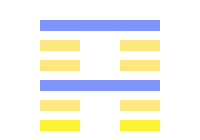
52.1.3.6 (52 > 24) - THE KĂN HEXAGRAM.
- 1. The first line, divided, shows its subject keep- ing his toes at rest. There will be no error; but it will be advantageous for him to be persistently firm and correct.
- 3. The third line, undivided, shows its subject keeping his loins at rest, and separating the ribs (from the body below). The situation is perilous, and the heart glows with suppressed excitement.
- 6. The sixth line, undivided, shows its subject devotedly maintaining his restfulness. There will be good fortune.
52.1.3.6 (52 > 24) - Stop
One increases one's feeling of comfort by letting others take the lead of the operations.
Bing DeepL Google Yandex52.1.3.6 (52 > 24) - Stop
One increases one's feeling of comfort by letting others take the lead of the operations.
Bing DeepL Google Yandex52.1.3.6 (52 > 24) - Kán, l’arrêt
Kán : ferme, tenir droit, bien réglé, arrêter, reposer
-
1. (On doit) tenir fermes ses pieds ; i. e. être toujours d’une ferme droiture.
Ne jamais perdre sa droiture. - 3. Se tenir ferme à sa place et le corps (litt. : les côtes) bien tenu, (c’est ainsi que l’on doit être).
-
6. Être tout appliqué à rester ferme dans le bien est une disposition très heureuse.
On peut ainsi être juste et droit jusqu’à la fin.
52.1.3.6 (52 > 24) - Cesser
On accroît sa sensation de confort en laissant les autres prendre la direction des opérations.
Bing DeepL Google Yandex52.1.3.6 (52 > 24) - Megállás
- 1. Nem megy megnézni mit tesznek a többiek hogy kerülje a bajokat.
- 3. A legalkalmasabbat kéri ha mások nem válaszolnak.
- 6. Tanulmányozza környezete igényeit mielőtt foglalkozna azokkal.
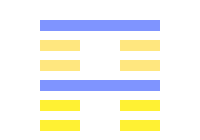
52.1.2.3.6 (52 > 19) - THE KĂN HEXAGRAM.
- 1. The first line, divided, shows its subject keep- ing his toes at rest. There will be no error; but it will be advantageous for him to be persistently firm and correct.
- 2. The second line, divided, shows its subject keeping the calves of his legs at rest. He cannot help (the subject of the line above) whom he follows, and is dissatisfied in his mind.
- 3. The third line, undivided, shows its subject keeping his loins at rest, and separating the ribs (from the body below). The situation is perilous, and the heart glows with suppressed excitement.
- 6. The sixth line, undivided, shows its subject devotedly maintaining his restfulness. There will be good fortune.
52.1.2.3.6 (52 > 19) - Stop
Each one spies on the other so as not to lose sight of each other.
Bing DeepL Google Yandex52.1.2.3.6 (52 > 19) - Stop
Each one spies on the other so as not to lose sight of each other.
Bing DeepL Google Yandex52.1.2.3.6 (52 > 19) - Kán, l’arrêt
Kán : ferme, tenir droit, bien réglé, arrêter, reposer
-
1. (On doit) tenir fermes ses pieds ; i. e. être toujours d’une ferme droiture.
Ne jamais perdre sa droiture. -
2. « Arrêter le mouvement des jambes ». (Ou les tenir droites et bien posées.) Si, devant s’arrêter, on ne peut aider celui qui marche devant soi, on doit en avoir du déplaisir.
On doit aider et se rendre au cri d’appel. - 3. Se tenir ferme à sa place et le corps (litt. : les côtes) bien tenu, (c’est ainsi que l’on doit être).
-
6. Être tout appliqué à rester ferme dans le bien est une disposition très heureuse.
On peut ainsi être juste et droit jusqu’à la fin.
52.1.2.3.6 (52 > 19) - Megállás
- 1. Nem megy megnézni mit tesznek a többiek hogy kerülje a bajokat.
- 2. Ha a másik többet akar, nem tarthatja vissza.
- 3. A legalkalmasabbat kéri ha mások nem válaszolnak.
- 6. Tanulmányozza környezete igényeit mielőtt foglalkozna azokkal.

52.1.4.6 (52 > 55) - THE KĂN HEXAGRAM.
- 1. The first line, divided, shows its subject keep- ing his toes at rest. There will be no error; but it will be advantageous for him to be persistently firm and correct.
- 4. The fourth line, divided, shows its subject keeping his trunk at rest. There will be no error.
- 6. The sixth line, undivided, shows its subject devotedly maintaining his restfulness. There will be good fortune.
52.1.4.6 (52 > 55) - Stop
One takes a nap until the others reach an agreement among themselves.
Bing DeepL Google Yandex52.1.4.6 (52 > 55) - Stop
One takes a nap until the others reach an agreement among themselves.
Bing DeepL Google Yandex52.1.4.6 (52 > 55) - Kán, l’arrêt
Kán : ferme, tenir droit, bien réglé, arrêter, reposer
-
1. (On doit) tenir fermes ses pieds ; i. e. être toujours d’une ferme droiture.
Ne jamais perdre sa droiture. - 4. Tenir le corps droit et ferme, c’est une bonne manière. [On doit tenir le corps entier tout droit.] (Répétition du § 3 pour en avoir six. Tenir le corps droit est un principe essentiel des rites chinois.)
-
6. Être tout appliqué à rester ferme dans le bien est une disposition très heureuse.
On peut ainsi être juste et droit jusqu’à la fin.
52.1.4.6 (52 > 55) - Cesser
On pique un somme le temps que les autres se mettent d'accord entre eux.
Bing DeepL Google Yandex52.1.4.6 (52 > 55) - Megállás
- 1. Nem megy megnézni mit tesznek a többiek hogy kerülje a bajokat.
- 4. Megáll, de mások folytatják.
- 6. Tanulmányozza környezete igényeit mielőtt foglalkozna azokkal.

52.1.2.4.6 (52 > 34) - THE KĂN HEXAGRAM.
- 1. The first line, divided, shows its subject keep- ing his toes at rest. There will be no error; but it will be advantageous for him to be persistently firm and correct.
- 2. The second line, divided, shows its subject keeping the calves of his legs at rest. He cannot help (the subject of the line above) whom he follows, and is dissatisfied in his mind.
- 4. The fourth line, divided, shows its subject keeping his trunk at rest. There will be no error.
- 6. The sixth line, undivided, shows its subject devotedly maintaining his restfulness. There will be good fortune.
52.1.2.4.6 (52 > 34) - Stop
One is absolutely sure that one has taken all the measures that others wanted.
Bing DeepL Google Yandex52.1.2.4.6 (52 > 34) - Stop
One is absolutely sure that one has taken all the measures that others wanted.
Bing DeepL Google Yandex52.1.2.4.6 (52 > 34) - Kán, l’arrêt
Kán : ferme, tenir droit, bien réglé, arrêter, reposer
-
1. (On doit) tenir fermes ses pieds ; i. e. être toujours d’une ferme droiture.
Ne jamais perdre sa droiture. -
2. « Arrêter le mouvement des jambes ». (Ou les tenir droites et bien posées.) Si, devant s’arrêter, on ne peut aider celui qui marche devant soi, on doit en avoir du déplaisir.
On doit aider et se rendre au cri d’appel. - 4. Tenir le corps droit et ferme, c’est une bonne manière. [On doit tenir le corps entier tout droit.] (Répétition du § 3 pour en avoir six. Tenir le corps droit est un principe essentiel des rites chinois.)
-
6. Être tout appliqué à rester ferme dans le bien est une disposition très heureuse.
On peut ainsi être juste et droit jusqu’à la fin.
52.1.2.4.6 (52 > 34) - Cesser
On est sûr et certain d'avoir pris toutes les mesures que les autres désiraient.
Bing DeepL Google Yandex52.1.2.4.6 (52 > 34) - Megállás
- 1. Nem megy megnézni mit tesznek a többiek hogy kerülje a bajokat.
- 2. Ha a másik többet akar, nem tarthatja vissza.
- 4. Megáll, de mások folytatják.
- 6. Tanulmányozza környezete igényeit mielőtt foglalkozna azokkal.
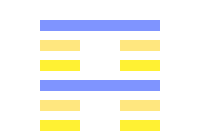
52.1.3.4.6 (52 > 51) - THE KĂN HEXAGRAM.
- 1. The first line, divided, shows its subject keep- ing his toes at rest. There will be no error; but it will be advantageous for him to be persistently firm and correct.
- 3. The third line, undivided, shows its subject keeping his loins at rest, and separating the ribs (from the body below). The situation is perilous, and the heart glows with suppressed excitement.
- 4. The fourth line, divided, shows its subject keeping his trunk at rest. There will be no error.
- 6. The sixth line, undivided, shows its subject devotedly maintaining his restfulness. There will be good fortune.
52.1.3.4.6 (52 > 51) - Stop
One abuses one's subordinates to make them move faster.
Bing DeepL Google Yandex52.1.3.4.6 (52 > 51) - Stop
One abuses one's subordinates to make them move faster.
Bing DeepL Google Yandex52.1.3.4.6 (52 > 51) - Kán, l’arrêt
Kán : ferme, tenir droit, bien réglé, arrêter, reposer
-
1. (On doit) tenir fermes ses pieds ; i. e. être toujours d’une ferme droiture.
Ne jamais perdre sa droiture. - 3. Se tenir ferme à sa place et le corps (litt. : les côtes) bien tenu, (c’est ainsi que l’on doit être).
- 4. Tenir le corps droit et ferme, c’est une bonne manière. [On doit tenir le corps entier tout droit.] (Répétition du § 3 pour en avoir six. Tenir le corps droit est un principe essentiel des rites chinois.)
-
6. Être tout appliqué à rester ferme dans le bien est une disposition très heureuse.
On peut ainsi être juste et droit jusqu’à la fin.
52.1.3.4.6 (52 > 51) - Cesser
On maltraite ses subalternes pour les faire avancer plus vite.
Bing DeepL Google Yandex52.1.3.4.6 (52 > 51) - Megállás
- 1. Nem megy megnézni mit tesznek a többiek hogy kerülje a bajokat.
- 3. A legalkalmasabbat kéri ha mások nem válaszolnak.
- 4. Megáll, de mások folytatják.
- 6. Tanulmányozza környezete igényeit mielőtt foglalkozna azokkal.
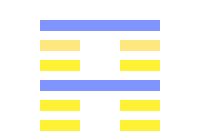
52.1.2.3.4.6 (52 > 54) - THE KĂN HEXAGRAM.
- 1. The first line, divided, shows its subject keep- ing his toes at rest. There will be no error; but it will be advantageous for him to be persistently firm and correct.
- 2. The second line, divided, shows its subject keeping the calves of his legs at rest. He cannot help (the subject of the line above) whom he follows, and is dissatisfied in his mind.
- 3. The third line, undivided, shows its subject keeping his loins at rest, and separating the ribs (from the body below). The situation is perilous, and the heart glows with suppressed excitement.
- 4. The fourth line, divided, shows its subject keeping his trunk at rest. There will be no error.
- 6. The sixth line, undivided, shows its subject devotedly maintaining his restfulness. There will be good fortune.
52.1.2.3.4.6 (52 > 54) - Stop
One does not weaken in order not to be seen failing.
Bing DeepL Google Yandex52.1.2.3.4.6 (52 > 54) - Stop
One does not weaken in order not to be seen failing.
Bing DeepL Google Yandex52.1.2.3.4.6 (52 > 54) - Kán, l’arrêt
Kán : ferme, tenir droit, bien réglé, arrêter, reposer
-
1. (On doit) tenir fermes ses pieds ; i. e. être toujours d’une ferme droiture.
Ne jamais perdre sa droiture. -
2. « Arrêter le mouvement des jambes ». (Ou les tenir droites et bien posées.) Si, devant s’arrêter, on ne peut aider celui qui marche devant soi, on doit en avoir du déplaisir.
On doit aider et se rendre au cri d’appel. - 3. Se tenir ferme à sa place et le corps (litt. : les côtes) bien tenu, (c’est ainsi que l’on doit être).
- 4. Tenir le corps droit et ferme, c’est une bonne manière. [On doit tenir le corps entier tout droit.] (Répétition du § 3 pour en avoir six. Tenir le corps droit est un principe essentiel des rites chinois.)
-
6. Être tout appliqué à rester ferme dans le bien est une disposition très heureuse.
On peut ainsi être juste et droit jusqu’à la fin.
52.1.2.3.4.6 (52 > 54) - Cesser
On ne faiblit pas pour ne pas se faire prendre en défaut.
Bing DeepL Google Yandex52.1.2.3.4.6 (52 > 54) - Megállás
- 1. Nem megy megnézni mit tesznek a többiek hogy kerülje a bajokat.
- 2. Ha a másik többet akar, nem tarthatja vissza.
- 3. A legalkalmasabbat kéri ha mások nem válaszolnak.
- 4. Megáll, de mások folytatják.
- 6. Tanulmányozza környezete igényeit mielőtt foglalkozna azokkal.

52.1.5.6 (52 > 63) - THE KĂN HEXAGRAM.
- 1. The first line, divided, shows its subject keep- ing his toes at rest. There will be no error; but it will be advantageous for him to be persistently firm and correct.
- 5. The fifth line, divided, shows its subject keeping his jawbones at rest, so that his words are (all) orderly. Occasion for repentance will disappear.
- 6. The sixth line, undivided, shows its subject devotedly maintaining his restfulness. There will be good fortune.
52.1.5.6 (52 > 63) - Stop
One can find anything but what one is looking for.
Bing DeepL Google Yandex52.1.5.6 (52 > 63) - Stop
One can find anything but what one is looking for.
Bing DeepL Google Yandex52.1.5.6 (52 > 63) - Kán, l’arrêt
Kán : ferme, tenir droit, bien réglé, arrêter, reposer
-
1. (On doit) tenir fermes ses pieds ; i. e. être toujours d’une ferme droiture.
Ne jamais perdre sa droiture. -
5. Tenir ses mâchoires de sorte que les paroles sortent de la bouche avec ordre et mesure, cela exempte de repentir.
On sait ainsi conserver le milieu. -
6. Être tout appliqué à rester ferme dans le bien est une disposition très heureuse.
On peut ainsi être juste et droit jusqu’à la fin.
52.1.5.6 (52 > 63) - Megállás
- 1. Nem megy megnézni mit tesznek a többiek hogy kerülje a bajokat.
- 5. Nem fejti ki kételyeit hogy ne okozzon nehézségeket.
- 6. Tanulmányozza környezete igényeit mielőtt foglalkozna azokkal.

52.1.2.5.6 (52 > 5) - THE KĂN HEXAGRAM.
- 1. The first line, divided, shows its subject keep- ing his toes at rest. There will be no error; but it will be advantageous for him to be persistently firm and correct.
- 2. The second line, divided, shows its subject keeping the calves of his legs at rest. He cannot help (the subject of the line above) whom he follows, and is dissatisfied in his mind.
- 5. The fifth line, divided, shows its subject keeping his jawbones at rest, so that his words are (all) orderly. Occasion for repentance will disappear.
- 6. The sixth line, undivided, shows its subject devotedly maintaining his restfulness. There will be good fortune.
52.1.2.5.6 (52 > 5) - Stop
One knows what will happen if one continues to hesitate.
Bing DeepL Google Yandex52.1.2.5.6 (52 > 5) - Stop
One knows what will happen if one continues to hesitate.
Bing DeepL Google Yandex52.1.2.5.6 (52 > 5) - Kán, l’arrêt
Kán : ferme, tenir droit, bien réglé, arrêter, reposer
-
1. (On doit) tenir fermes ses pieds ; i. e. être toujours d’une ferme droiture.
Ne jamais perdre sa droiture. -
2. « Arrêter le mouvement des jambes ». (Ou les tenir droites et bien posées.) Si, devant s’arrêter, on ne peut aider celui qui marche devant soi, on doit en avoir du déplaisir.
On doit aider et se rendre au cri d’appel. -
5. Tenir ses mâchoires de sorte que les paroles sortent de la bouche avec ordre et mesure, cela exempte de repentir.
On sait ainsi conserver le milieu. -
6. Être tout appliqué à rester ferme dans le bien est une disposition très heureuse.
On peut ainsi être juste et droit jusqu’à la fin.
52.1.2.5.6 (52 > 5) - Cesser
On sait ce qu'il va arriver si l'on continue à hésiter.
Bing DeepL Google Yandex52.1.2.5.6 (52 > 5) - Megállás
- 1. Nem megy megnézni mit tesznek a többiek hogy kerülje a bajokat.
- 2. Ha a másik többet akar, nem tarthatja vissza.
- 5. Nem fejti ki kételyeit hogy ne okozzon nehézségeket.
- 6. Tanulmányozza környezete igényeit mielőtt foglalkozna azokkal.
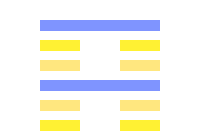
52.1.3.5.6 (52 > 3) - THE KĂN HEXAGRAM.
- 1. The first line, divided, shows its subject keep- ing his toes at rest. There will be no error; but it will be advantageous for him to be persistently firm and correct.
- 3. The third line, undivided, shows its subject keeping his loins at rest, and separating the ribs (from the body below). The situation is perilous, and the heart glows with suppressed excitement.
- 5. The fifth line, divided, shows its subject keeping his jawbones at rest, so that his words are (all) orderly. Occasion for repentance will disappear.
- 6. The sixth line, undivided, shows its subject devotedly maintaining his restfulness. There will be good fortune.
52.1.3.5.6 (52 > 3) - Stop
One will discover a solution that others had not considered.
Bing DeepL Google Yandex52.1.3.5.6 (52 > 3) - Stop
One will discover a solution that others had not considered.
Bing DeepL Google Yandex52.1.3.5.6 (52 > 3) - Kán, l’arrêt
Kán : ferme, tenir droit, bien réglé, arrêter, reposer
-
1. (On doit) tenir fermes ses pieds ; i. e. être toujours d’une ferme droiture.
Ne jamais perdre sa droiture. - 3. Se tenir ferme à sa place et le corps (litt. : les côtes) bien tenu, (c’est ainsi que l’on doit être).
-
5. Tenir ses mâchoires de sorte que les paroles sortent de la bouche avec ordre et mesure, cela exempte de repentir.
On sait ainsi conserver le milieu. -
6. Être tout appliqué à rester ferme dans le bien est une disposition très heureuse.
On peut ainsi être juste et droit jusqu’à la fin.
52.1.3.5.6 (52 > 3) - Cesser
On va découvrir une solution que les autres n'avaient pas envisagée.
Bing DeepL Google Yandex52.1.3.5.6 (52 > 3) - Megállás
- 1. Nem megy megnézni mit tesznek a többiek hogy kerülje a bajokat.
- 3. A legalkalmasabbat kéri ha mások nem válaszolnak.
- 5. Nem fejti ki kételyeit hogy ne okozzon nehézségeket.
- 6. Tanulmányozza környezete igényeit mielőtt foglalkozna azokkal.
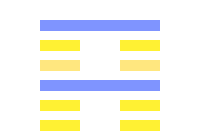
52.1.2.3.5.6 (52 > 60) - THE KĂN HEXAGRAM.
- 1. The first line, divided, shows its subject keep- ing his toes at rest. There will be no error; but it will be advantageous for him to be persistently firm and correct.
- 2. The second line, divided, shows its subject keeping the calves of his legs at rest. He cannot help (the subject of the line above) whom he follows, and is dissatisfied in his mind.
- 3. The third line, undivided, shows its subject keeping his loins at rest, and separating the ribs (from the body below). The situation is perilous, and the heart glows with suppressed excitement.
- 5. The fifth line, divided, shows its subject keeping his jawbones at rest, so that his words are (all) orderly. Occasion for repentance will disappear.
- 6. The sixth line, undivided, shows its subject devotedly maintaining his restfulness. There will be good fortune.
52.1.2.3.5.6 (52 > 60) - Stop
One concludes one's exercises with fun and games.
Bing DeepL Google Yandex52.1.2.3.5.6 (52 > 60) - Stop
One concludes one's exercises with fun and games.
Bing DeepL Google Yandex52.1.2.3.5.6 (52 > 60) - Kán, l’arrêt
Kán : ferme, tenir droit, bien réglé, arrêter, reposer
-
1. (On doit) tenir fermes ses pieds ; i. e. être toujours d’une ferme droiture.
Ne jamais perdre sa droiture. -
2. « Arrêter le mouvement des jambes ». (Ou les tenir droites et bien posées.) Si, devant s’arrêter, on ne peut aider celui qui marche devant soi, on doit en avoir du déplaisir.
On doit aider et se rendre au cri d’appel. - 3. Se tenir ferme à sa place et le corps (litt. : les côtes) bien tenu, (c’est ainsi que l’on doit être).
-
5. Tenir ses mâchoires de sorte que les paroles sortent de la bouche avec ordre et mesure, cela exempte de repentir.
On sait ainsi conserver le milieu. -
6. Être tout appliqué à rester ferme dans le bien est une disposition très heureuse.
On peut ainsi être juste et droit jusqu’à la fin.
52.1.2.3.5.6 (52 > 60) - Cesser
On termine ses exercices par une partie de plaisir.
Bing DeepL Google Yandex52.1.2.3.5.6 (52 > 60) - Megállás
- 1. Nem megy megnézni mit tesznek a többiek hogy kerülje a bajokat.
- 2. Ha a másik többet akar, nem tarthatja vissza.
- 3. A legalkalmasabbat kéri ha mások nem válaszolnak.
- 5. Nem fejti ki kételyeit hogy ne okozzon nehézségeket.
- 6. Tanulmányozza környezete igényeit mielőtt foglalkozna azokkal.

52.1.4.5.6 (52 > 49) - THE KĂN HEXAGRAM.
- 1. The first line, divided, shows its subject keep- ing his toes at rest. There will be no error; but it will be advantageous for him to be persistently firm and correct.
- 4. The fourth line, divided, shows its subject keeping his trunk at rest. There will be no error.
- 5. The fifth line, divided, shows its subject keeping his jawbones at rest, so that his words are (all) orderly. Occasion for repentance will disappear.
- 6. The sixth line, undivided, shows its subject devotedly maintaining his restfulness. There will be good fortune.
52.1.4.5.6 (52 > 49) - Stop
One compensates for one' s lack of success with flawless health practices.
Bing DeepL Google Yandex52.1.4.5.6 (52 > 49) - Stop
One compensates for one' s lack of success with flawless health practices.
Bing DeepL Google Yandex52.1.4.5.6 (52 > 49) - Kán, l’arrêt
Kán : ferme, tenir droit, bien réglé, arrêter, reposer
-
1. (On doit) tenir fermes ses pieds ; i. e. être toujours d’une ferme droiture.
Ne jamais perdre sa droiture. - 4. Tenir le corps droit et ferme, c’est une bonne manière. [On doit tenir le corps entier tout droit.] (Répétition du § 3 pour en avoir six. Tenir le corps droit est un principe essentiel des rites chinois.)
-
5. Tenir ses mâchoires de sorte que les paroles sortent de la bouche avec ordre et mesure, cela exempte de repentir.
On sait ainsi conserver le milieu. -
6. Être tout appliqué à rester ferme dans le bien est une disposition très heureuse.
On peut ainsi être juste et droit jusqu’à la fin.
52.1.4.5.6 (52 > 49) - Cesser
On compense son manque de réussite par une hygiène de vie sans faille.
Bing DeepL Google Yandex52.1.4.5.6 (52 > 49) - Megállás
- 1. Nem megy megnézni mit tesznek a többiek hogy kerülje a bajokat.
- 4. Megáll, de mások folytatják.
- 5. Nem fejti ki kételyeit hogy ne okozzon nehézségeket.
- 6. Tanulmányozza környezete igényeit mielőtt foglalkozna azokkal.
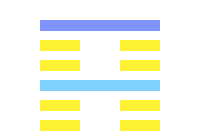
52.1.2.4.5.6 (52 > 43) - THE KĂN HEXAGRAM.
- 1. The first line, divided, shows its subject keep- ing his toes at rest. There will be no error; but it will be advantageous for him to be persistently firm and correct.
- 2. The second line, divided, shows its subject keeping the calves of his legs at rest. He cannot help (the subject of the line above) whom he follows, and is dissatisfied in his mind.
- 4. The fourth line, divided, shows its subject keeping his trunk at rest. There will be no error.
- 5. The fifth line, divided, shows its subject keeping his jawbones at rest, so that his words are (all) orderly. Occasion for repentance will disappear.
- 6. The sixth line, undivided, shows its subject devotedly maintaining his restfulness. There will be good fortune.
52.1.2.4.5.6 (52 > 43) - Losing freshness
One finds something rotten in what should be impeccable.
Bing DeepL Google Yandex52.1.2.4.5.6 (52 > 43) - Losing freshness
One finds something rotten in what should be impeccable.
Bing DeepL Google Yandex52.1.2.4.5.6 (52 > 43) - Kán, l’arrêt
Kán : ferme, tenir droit, bien réglé, arrêter, reposer
-
1. (On doit) tenir fermes ses pieds ; i. e. être toujours d’une ferme droiture.
Ne jamais perdre sa droiture. -
2. « Arrêter le mouvement des jambes ». (Ou les tenir droites et bien posées.) Si, devant s’arrêter, on ne peut aider celui qui marche devant soi, on doit en avoir du déplaisir.
On doit aider et se rendre au cri d’appel. - 4. Tenir le corps droit et ferme, c’est une bonne manière. [On doit tenir le corps entier tout droit.] (Répétition du § 3 pour en avoir six. Tenir le corps droit est un principe essentiel des rites chinois.)
-
5. Tenir ses mâchoires de sorte que les paroles sortent de la bouche avec ordre et mesure, cela exempte de repentir.
On sait ainsi conserver le milieu. -
6. Être tout appliqué à rester ferme dans le bien est une disposition très heureuse.
On peut ainsi être juste et droit jusqu’à la fin.
52.1.2.4.5.6 (52 > 43) - Perdre sa fraîcheur
On trouve quelque chose de pourri dans ce qui devrait être impeccable.
Bing DeepL Google Yandex52.1.2.4.5.6 (52 > 43) - Megállás
- 1. Nem megy megnézni mit tesznek a többiek hogy kerülje a bajokat.
- 2. Ha a másik többet akar, nem tarthatja vissza.
- 4. Megáll, de mások folytatják.
- 5. Nem fejti ki kételyeit hogy ne okozzon nehézségeket.
- 6. Tanulmányozza környezete igényeit mielőtt foglalkozna azokkal.
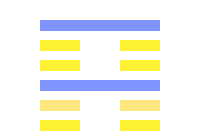
52.1.3.4.5.6 (52 > 17) - THE KĂN HEXAGRAM.
- 1. The first line, divided, shows its subject keep- ing his toes at rest. There will be no error; but it will be advantageous for him to be persistently firm and correct.
- 3. The third line, undivided, shows its subject keeping his loins at rest, and separating the ribs (from the body below). The situation is perilous, and the heart glows with suppressed excitement.
- 4. The fourth line, divided, shows its subject keeping his trunk at rest. There will be no error.
- 5. The fifth line, divided, shows its subject keeping his jawbones at rest, so that his words are (all) orderly. Occasion for repentance will disappear.
- 6. The sixth line, undivided, shows its subject devotedly maintaining his restfulness. There will be good fortune.
52.1.3.4.5.6 (52 > 17) - Stop
One compares oneself to others to avoid feeling sorry for oneself.
Bing DeepL Google Yandex52.1.3.4.5.6 (52 > 17) - Stop
One compares oneself to others to avoid feeling sorry for oneself.
Bing DeepL Google Yandex52.1.3.4.5.6 (52 > 17) - Kán, l’arrêt
Kán : ferme, tenir droit, bien réglé, arrêter, reposer
-
1. (On doit) tenir fermes ses pieds ; i. e. être toujours d’une ferme droiture.
Ne jamais perdre sa droiture. - 3. Se tenir ferme à sa place et le corps (litt. : les côtes) bien tenu, (c’est ainsi que l’on doit être).
- 4. Tenir le corps droit et ferme, c’est une bonne manière. [On doit tenir le corps entier tout droit.] (Répétition du § 3 pour en avoir six. Tenir le corps droit est un principe essentiel des rites chinois.)
-
5. Tenir ses mâchoires de sorte que les paroles sortent de la bouche avec ordre et mesure, cela exempte de repentir.
On sait ainsi conserver le milieu. -
6. Être tout appliqué à rester ferme dans le bien est une disposition très heureuse.
On peut ainsi être juste et droit jusqu’à la fin.
52.1.3.4.5.6 (52 > 17) - Cesser
On se compare aux autres pour éviter de s'apitoyer sur son sort.
Bing DeepL Google Yandex52.1.3.4.5.6 (52 > 17) - Megállás
- 1. Nem megy megnézni mit tesznek a többiek hogy kerülje a bajokat.
- 3. A legalkalmasabbat kéri ha mások nem válaszolnak.
- 4. Megáll, de mások folytatják.
- 5. Nem fejti ki kételyeit hogy ne okozzon nehézségeket.
- 6. Tanulmányozza környezete igényeit mielőtt foglalkozna azokkal.
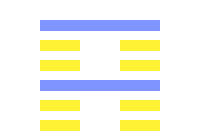
52.1.2.3.4.5.6 (52 > 58) - THE KĂN HEXAGRAM.
- 1. The first line, divided, shows its subject keep- ing his toes at rest. There will be no error; but it will be advantageous for him to be persistently firm and correct.
- 2. The second line, divided, shows its subject keeping the calves of his legs at rest. He cannot help (the subject of the line above) whom he follows, and is dissatisfied in his mind.
- 3. The third line, undivided, shows its subject keeping his loins at rest, and separating the ribs (from the body below). The situation is perilous, and the heart glows with suppressed excitement.
- 4. The fourth line, divided, shows its subject keeping his trunk at rest. There will be no error.
- 5. The fifth line, divided, shows its subject keeping his jawbones at rest, so that his words are (all) orderly. Occasion for repentance will disappear.
- 6. The sixth line, undivided, shows its subject devotedly maintaining his restfulness. There will be good fortune.
52.1.2.3.4.5.6 (52 > 58) - Stop
One would like to move faster but the others need to rest.
Bing DeepL Google Yandex52.1.2.3.4.5.6 (52 > 58) - Stop
One would like to move faster but the others need to rest.
Bing DeepL Google Yandex52.1.2.3.4.5.6 (52 > 58) - Kán, l’arrêt
Kán : ferme, tenir droit, bien réglé, arrêter, reposer
-
1. (On doit) tenir fermes ses pieds ; i. e. être toujours d’une ferme droiture.
Ne jamais perdre sa droiture. -
2. « Arrêter le mouvement des jambes ». (Ou les tenir droites et bien posées.) Si, devant s’arrêter, on ne peut aider celui qui marche devant soi, on doit en avoir du déplaisir.
On doit aider et se rendre au cri d’appel. - 3. Se tenir ferme à sa place et le corps (litt. : les côtes) bien tenu, (c’est ainsi que l’on doit être).
- 4. Tenir le corps droit et ferme, c’est une bonne manière. [On doit tenir le corps entier tout droit.] (Répétition du § 3 pour en avoir six. Tenir le corps droit est un principe essentiel des rites chinois.)
-
5. Tenir ses mâchoires de sorte que les paroles sortent de la bouche avec ordre et mesure, cela exempte de repentir.
On sait ainsi conserver le milieu. -
6. Être tout appliqué à rester ferme dans le bien est une disposition très heureuse.
On peut ainsi être juste et droit jusqu’à la fin.
52.1.2.3.4.5.6 (52 > 58) - Cesser
On voudrait avancer plus vite mais les autres ont besoin de se reposer.
Bing DeepL Google Yandex52.1.2.3.4.5.6 (52 > 58) - Megállás
- 1. Nem megy megnézni mit tesznek a többiek hogy kerülje a bajokat.
- 2. Ha a másik többet akar, nem tarthatja vissza.
- 3. A legalkalmasabbat kéri ha mások nem válaszolnak.
- 4. Megáll, de mások folytatják.
- 5. Nem fejti ki kételyeit hogy ne okozzon nehézségeket.
- 6. Tanulmányozza környezete igényeit mielőtt foglalkozna azokkal.

